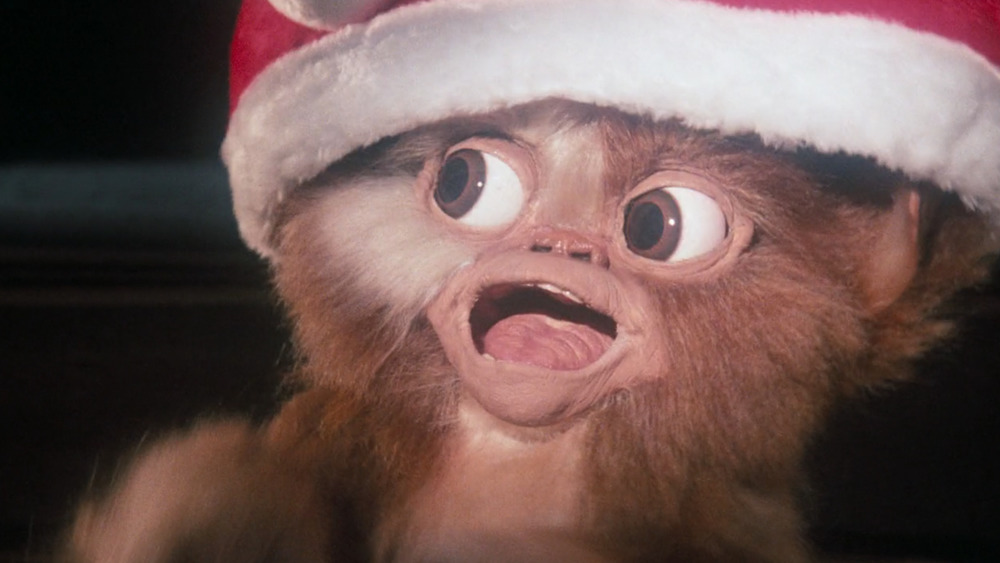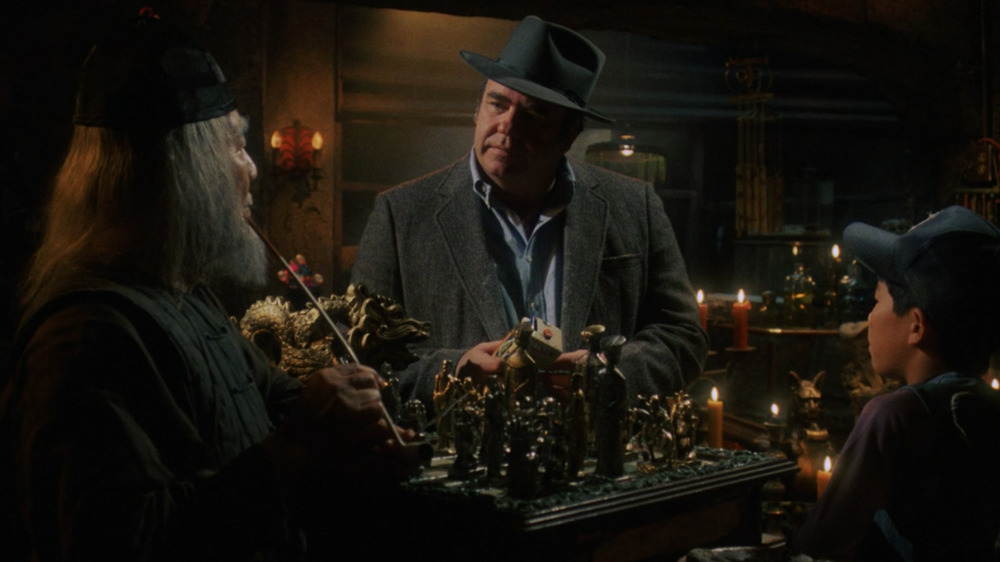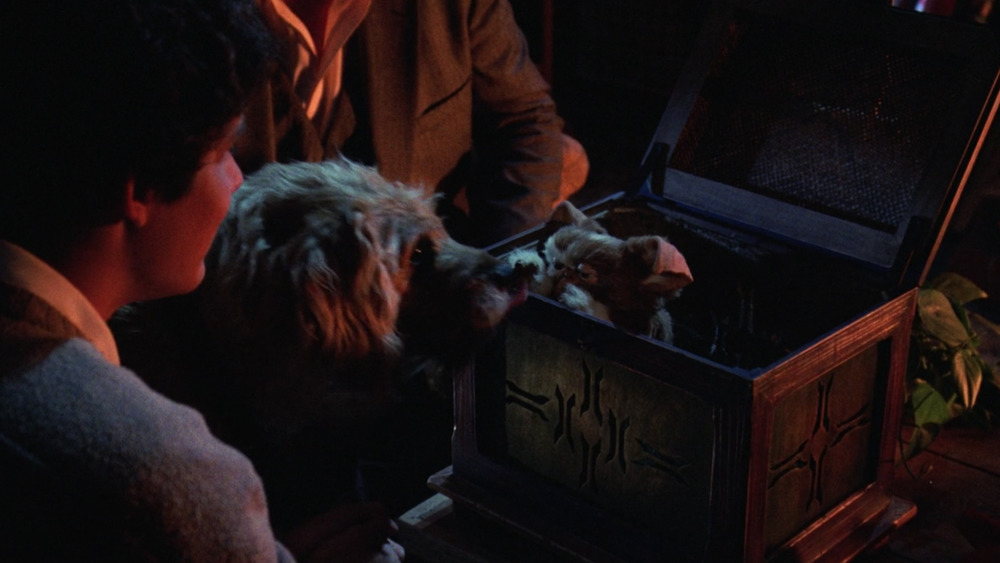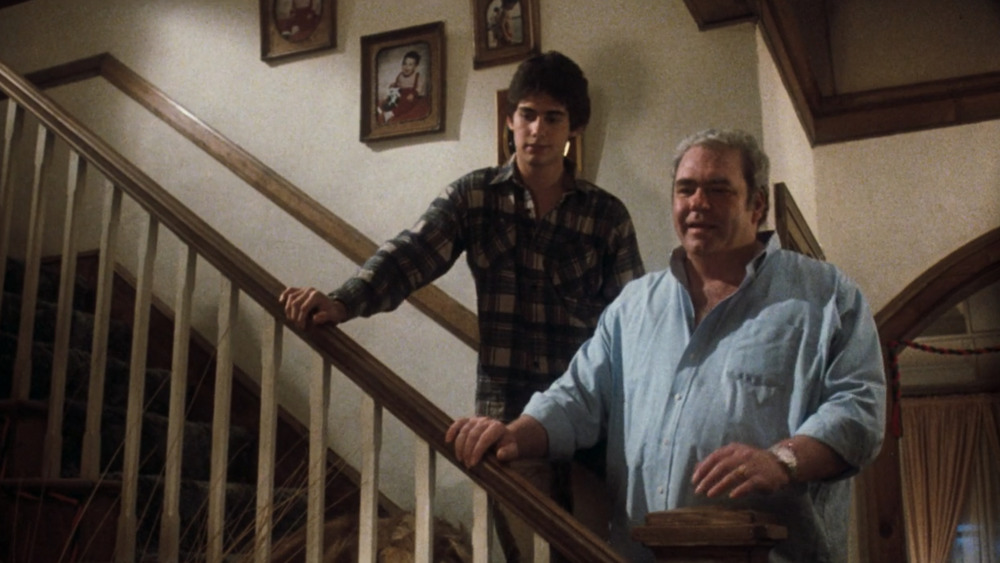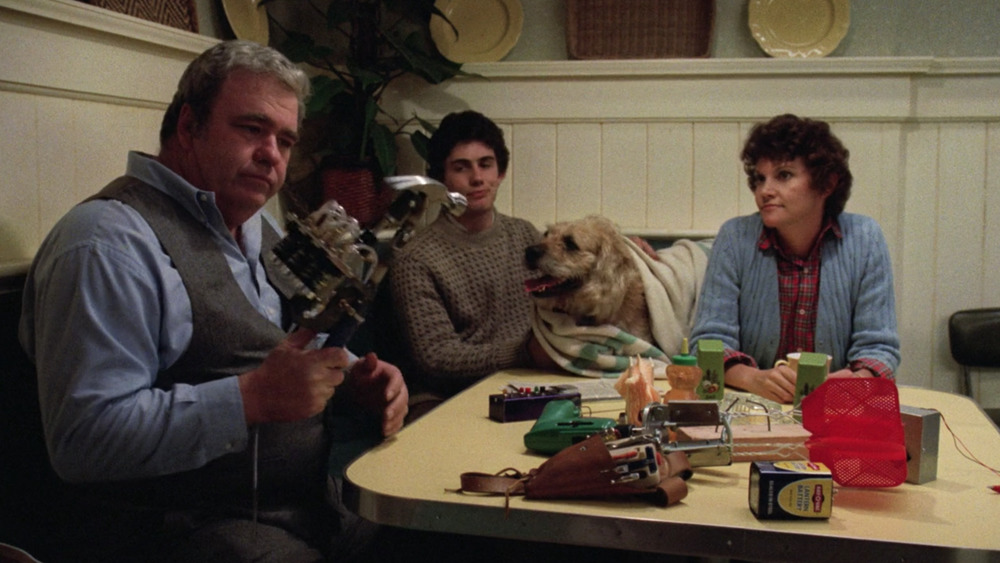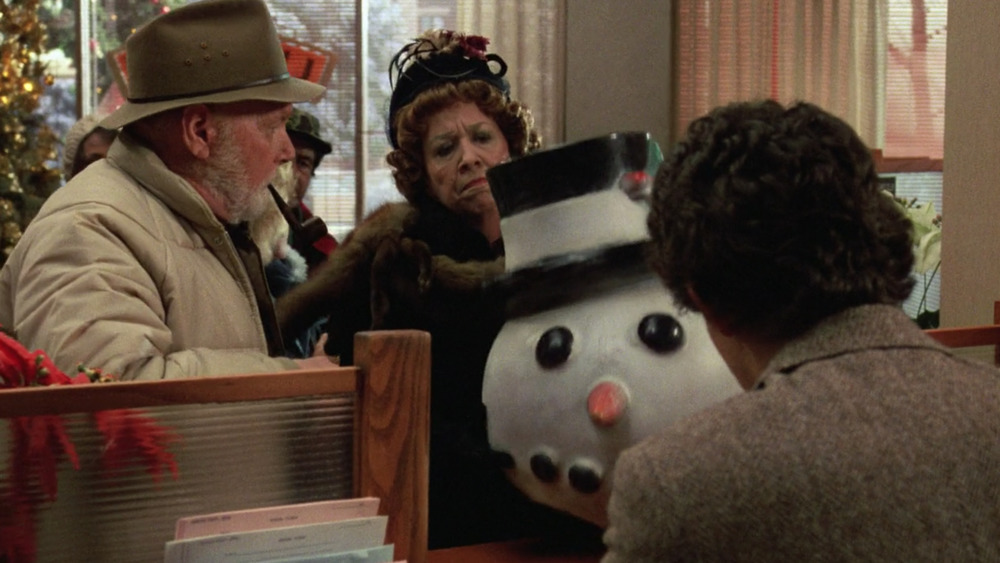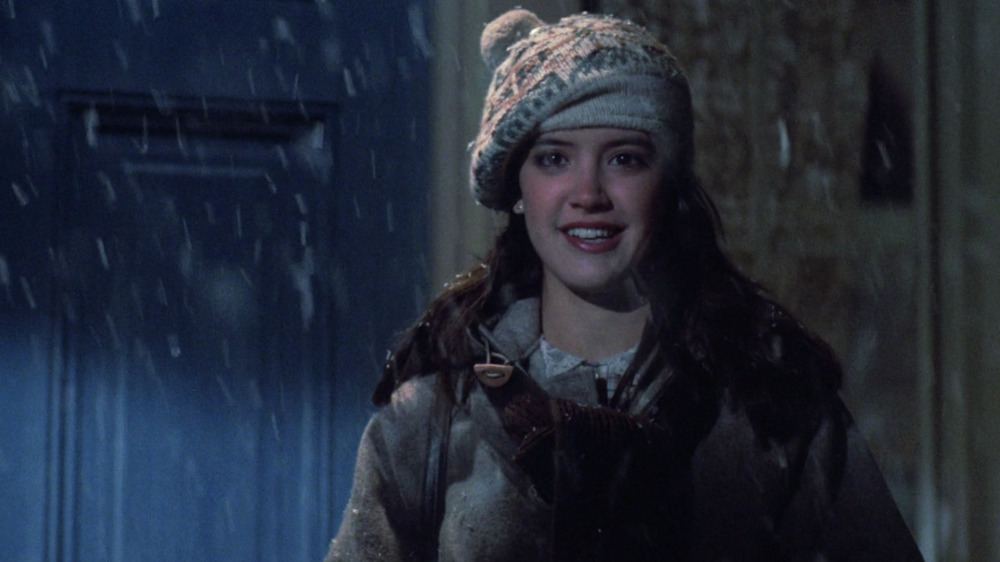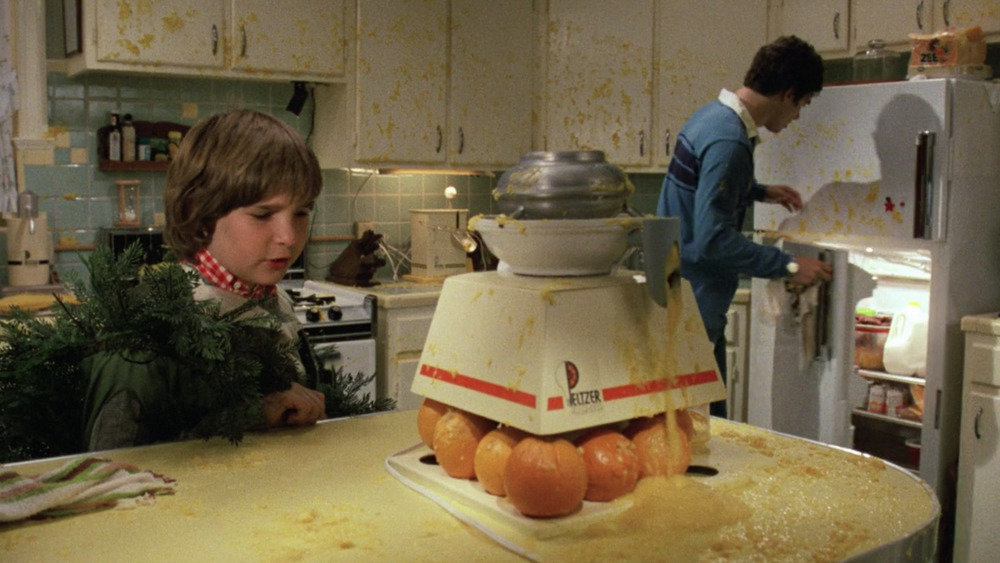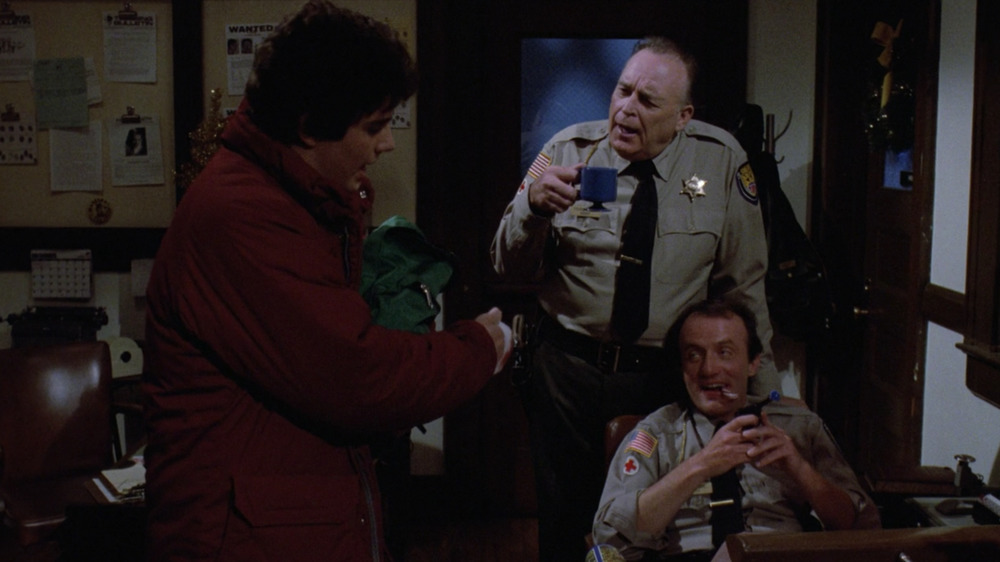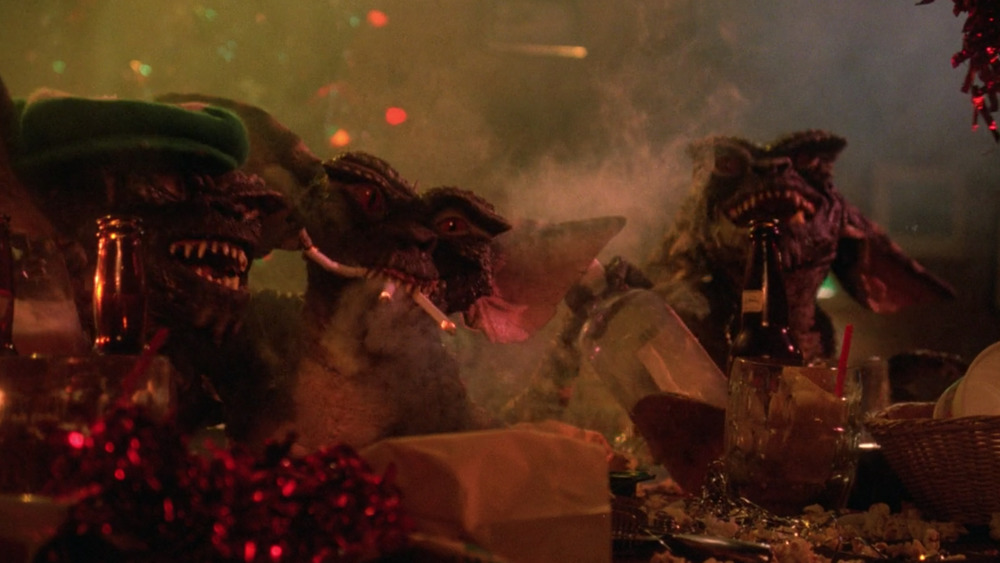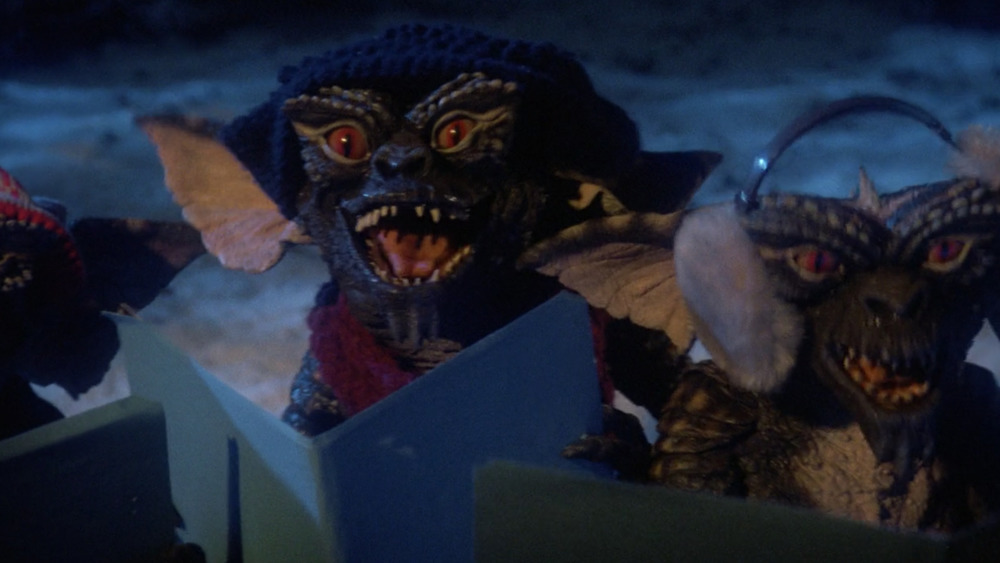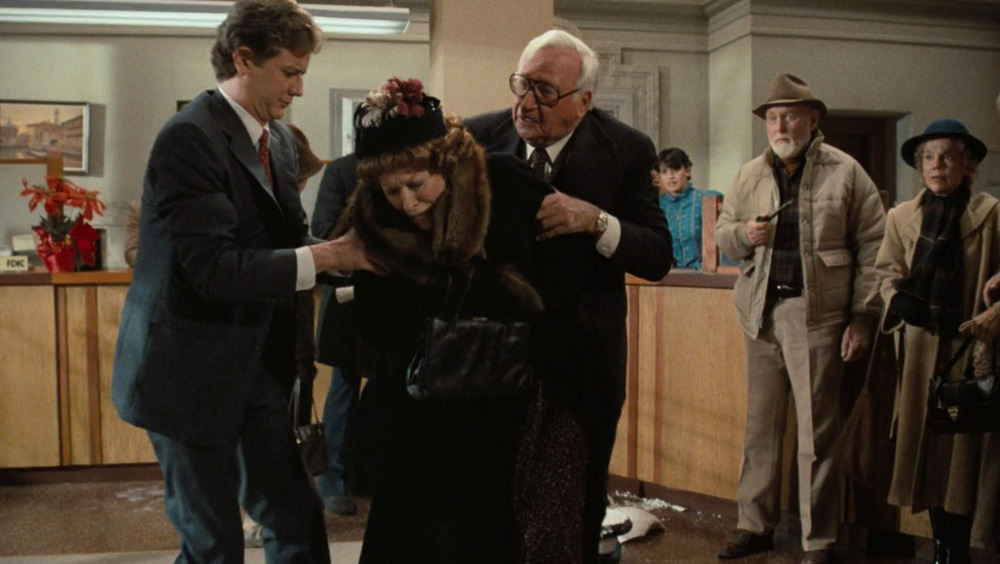Things Only Adults Notice In Gremlins
Holiday movie or summer blockbuster?
It doesn't matter. Gremlins is a classic that has a bit of everything. It was originally released in the summer despite the plot taking place during Christmastime, yet Gremlins has elements of comedy and horror. This movie is clearly a genre nightmare, but that doesn't take anything away from the viewing experience. If anything, it makes the movie more universal, although the dark elements and lack of a PG-13 label can make certain aspects harder for younger viewers to understand.
The storyline of the 1984 film follows a young man named Billy Peltzer (Zach Galligan), whose life morphs from mundane to chaotic after he receives a strange creature called a mogwai from his father Randall "Rand" Peltzer (the late Hoyt Axton). Things go all kinds of wrong when Billy inadvertently — yet carelessly — breaks three important rules concerning his new pet, named Gizmo. The result is a slew of tiny, mischievous monsters who nearly take over the small town of Kingston Falls during the holidays.
Gremlins' more violent aspects played a role in spawning the PG-13 rating, and overall, the movie is less age-appropriate than adults might remember, with certain situations that can easily go over the heads of younger viewers. From bad inventions to the wonders of mogwai, here are things only adults notice in Gremlins.
Why was Gizmo out in the open at Mr. Wing's store?
Mogwai might be the cutest creatures on the planet, but they're fickle beings that require close attention. Mogwai are also creatures beyond human comprehension of the natural world. They shouldn't, therefore, sit out in the open at, say, a Chinatown antique store. Mogwai are mysterious and rare furry creatures that should not be for sale on the open market, which begs the question: Why was Gizmo visible at Mr. Wing's (the late Keye Luke) store?
Yes, Gizmo is cute wrapped up in a ball, but his species can also be dangerous and lethal to humankind if proper protocols aren't followed. Mr. Wing and his grandson know this before Rand walks into their store on the night that sets the events of the film in motion, yet the grandson sells the fur baby to him anyway for a measly couple hundred bucks. We've heard of hiding in plain sight, but this is ridiculous: Although no one likes someone who picks nits, in no universe should Gizmo sit in a store for customers to see.
Rand wants to buy a creature he knows nothing about for his adult son
When Rand decides to buy Gizmo for his son, the audience likely pictures a young child who may or may not have abandonment issues. But then Rand returns home with little Gizmo to a young adult who, mind you, already owns a dog. Billy isn't a child... he's a young adult who financially supports his mom, dad, and himself.
Needless to say, there are a lot of problems with Rand buying the mogwai in the first place. To recap, Rand purchases a foreign creature from a mysterious shop. His family is struggling financially, yet Rand pays $200 for the mogwai when his son is offering a financial safety net. The family already cares for a dog — and that dog is so attached to Billy that he goes to work with him.
The parenting playbook is a tough one to crack and it's not always universal, but Rand brought an unknown being that he couldn't afford into his family's house. Talk about making a plot work at all costs.
Billy supports his parents so his dad can follow his dreams of inventing things
It's well known that Billy supports his parents financially. But it's more complicated than that: Billy works at a bank so his dad can follow his dreams of being an inventor. Not all families are the same, but it should be the other way around. Billy's parents should be supporting him so he can follow his dreams, yet Billy appears to be the only person in the household with a stable income. And his salary is somehow enough to support his parents and himself while Rand disappears to conventions and spends money foolishly. Rand presumably brings in some income for his family, but the film endlessly portrays Rand failing at sales attempts — unless one can count his bid to make a deal with a kid as a successful sales attempt, and that one ends up with Rand spending money.
Billy, a kind and generous young adult, deserves better — yet all of this could easily go over the head of younger audience members.
All the ways Rand misses redemption
Rand never redeems himself. His response to Gizmo multiplying when he gets wet tells the audience everything they need to know about his personality: He doesn't panic or have the brainpower to foreshadow how that could lead to life-threatening problems for his loved ones. Instead, he views the situation as an opportunity to make money and peddle mogwai to households during the holiday season. Similar to the way he works with his inventions, he's ready to place mogwai on shelves before studying the product and ensuring it's ready for sale.
But wait, there's more: Rand leaves his family to attend an inventor's convention on Christmas Eve — a night when he should definitely be home with his family. (Who scheduled this thing, anyway?) And while the town is being taken over by gremlins, during the holidays, Rand is busy trying to sell his terrible inventions. In true Rand fashion, he returns to Kingston Falls in the aftermath of the town being taken over by gremlins... As do the authorities and news stations, for that matter.
Rand might appear to be trying to help his family, but his actions lead to more harm than good, and it's hard not to believe he only thinks about himself as he's perpetually trying to make a quick buck.
Mrs. Deagle is a truly evil person
In a movie suffused with Christmas cheer, decorations, and snow, Mrs. Ruby Deagle (Polly Holliday) is a typical Ebenezer Scrooge type. She's a rich, cruel, cold-hearted miser. Mrs. Deagle, in a nutshell, is the kind of person who will do anything to make more money. She's also the kind of person who angrily enters a bank, cuts to the front of the line, and threatens to kill someone's dog.
Although Mrs. Deagle's behavior can come off as comic relief, especially when the camera zooms in on Billy's dog Barney, her words are stained with cruelty and tell the audience everything they need to know about her. After all, she threatens to take Barney to the kennel and put him to sleep, a quicker and painless death compared to what she would do to him. She also says she'll catch "the beast" herself and put him in her spin-dryer on high heat. Those are, without a doubt, words spoken by a truly evil and vile person. And audiences who've only seen the Gremlins theatrical cut don't know the half of it — Mrs. Deagle committed other horrible deeds in the deleted scenes.
The Fast Times at Ridgemont High Cinematic Universe
Recognizing a familiar face in a movie or TV show is basically a rite of passage. For audience members who have seen the classic 1982 coming-of-age comedy Fast Times at Ridgemont High, it's hard not to notice a couple of familiar faces in Gremlins. Judge Reinhold, who plays bank employee Gerald Hopkins, and Phoebe Cates, who plays Billy's love interest Kate Beringer, also starred in Fast Times at Ridgemont High.
This should go unnoticed for younger viewers, as Fast Times at Ridgemont High is very much unsuitable for children. That movie was also released two years before Gremlins, when Reinhold and Cates were still young, up-and-coming talents — by the end of the decade, they'd both gone on to star in numerous other films. Seeing them together again in Gremlins is bound to spark some nostalgia in older viewers, but for the kids in the audience, they're just another couple of actors.
Rand's inventions make his family's lives worse
Although Rand is creative, his inventions appear to make his family's lives tougher. That goes against the entire point of his career, of course, as he's trying to provide convenient solutions to everyday problems.
His coffee machine makes the coffee come out as inedible goo, his orange juice invention sprays orange juice everywhere, his makeshift speakerphone doesn't work, and his lidless blender proves dysfunctional when his wife Lynn (Frances Lee McCain) tosses a gremlin into it and the little guy's insides spray all over the kitchen.
Rand is a failing inventor whose efforts to get rich quick only put his family through financial turmoil. Even worse is that they feels the need to support him by using his ineffective household appliances that don't do what they're supposed to, and typically lead to unnecessary messes. In Rand's defense, that lidless blender at least came up clutch when Lynn was fending off the herd of gremlins — unfortunately, he didn't have yet another invention standing by to clean up the mess it left behind.
Incompetent authority figures
Movie tropes are gifts that keep on giving. Romantic comedies are flooded with will-they-or-won't-they stories, when the audience knows they will by the end of the movie. In horror movies, characters tend to run into abandoned places, such as a warehouse or cabin in the woods. Another trope that continues to be played on repeat in PG movies is authorities or parental figures acting more as background scenery than plot-defining characters.
In Gremlins, Billy tells the cops that little monsters are taking over the town. He even shows them Gizmo as proof of their existence. In typical movie fashion, however, the authorities don't believe Billy's story, even though they just saw, with their own eyes, a creature that the wider world doesn't know exists. Classic.
In another instance, instead of helping a citizen who's being attacked by gremlins, these same police officers leave the scene in fear of their safety. What is it with authority figures being useless in PG movies? Not to mention the entire town is being hijacked and the authorities don't call the military or any form of backup. Of course, this wouldn't have happened in a social media world, but Gremlins hit theaters in the '80s. Either way, adults in the audience will note that small towns don't have the same resources as big cities — something likely lost on younger viewers.
Gremlins are fast learners
Gremlins are different from humans in countless ways, but they do share an advanced intelligence. Simply put: They're fast learners. Shortly after mogwai turn into gremlins, they pick up on their surroundings and adapt to the world. Not only are gremlins evidently able to learn human language, they know the consequences of, say, weapons. They also morph into adults in the blink of an eye. Within a matter of hours after hatching from their cocoons, a group of gremlins go to a bar, where they sing, drink, smoke, and act like drunks. They even have guns, proving how fast they lose any childlike resemblance they may have once had.
Gremlins always end up provoking some sort of fatal conflict with humans, so it remains to be seen how smart they might become if left to their own devices, as well as how quickly they might continue to adapt to their environment. Based on the way they behave in the hours and days after they hatch, we're all undoubtedly better off that way.
Flaws with the Gremlins' three rules
Mogwai have three important rules that must never be broken: Don't expose them to light (especially sunlight), keep them away from water, and never feed them after midnight. After all, sunlight can kill them, water makes them multiply, and feeding them after midnight leads to mogwai turning into gremlins. A mogwai is a teddy bear-like creature and kind-hearted by nature, whereas a gremlin is reptilian and causes chaos and destruction.
The problem with these rules is that Mr. Wing and his grandson know the repercussions if they're broken, so Gizmo shouldn't have been anywhere near customers in the first place, let alone at the store where anyone could find him. Regardless of that, and the fact that Mr. Wing's grandson was vague about the rules, the movie takes place during the winter, when snow is already blanketing the ground. In theory, if gremlins touched the snow (a form of water), they would multiply. While the movie doesn't technically disprove this theory, a scene also shows a group of gremlins caroling outside... in the snow. The point being, by the time Billy and Gizmo try to save the town, there should have been countless gremlins as they should have exponentially multiplied every time they touched the snow or came into contact with any form of water. And then there's the scene in which gremlins smoke in the bar. They had to light the cigarettes somehow, and fire, as well as the end of a cigarette, should have agitated them. Apparently, as long as gremlins aren't aware of water or light, it doesn't affect them?
Mr. Corben and Gerald's stories vanish without cause
Mr. Roland Corben (the late Edward Andrews) is the bank manager and Billy's boss. Although he's not necessarily a bona fide antagonist, he appears to have a rocky relationship with Billy and a good relationship with Gerald Hopkins, a bank employee and Billy's rival.
Gerald asks out Kate in front of Billy and threatens that he'd fire him, if only he managed the bank. A typical rivalry begins to brew between Billy and Gerald, but the film moves on from that plot point altogether. The bar scene is the last time the audience sees Gerald, which is unfortunate because it occurs early in the movie. Gerald appears more in deleted footage, but the original picture cuts off his and Mr. Corben's storylines without cause.
Of course, in the end, none of these inconsistencies matter all that much. Billy and Gizmo save the day, casualties are mostly brushed off, the movie ends with the main characters living happily ever after, and these realizations ultimately don't take anything away from Gremlins.
